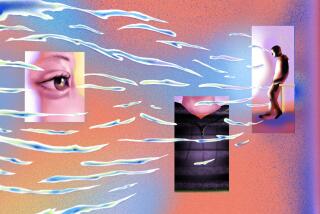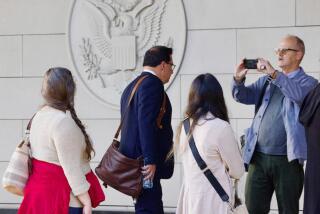On Thanksgiving, that holiday spirit
On Thanksgiving Day, nine years ago, I stole my father’s car.
He was 88 years old and living in a retirement community in Ojai. The previous July, he’d failed his driver’s test, but he’d kept driving without a license — and therefore, without insurance. Perhaps he had forgotten that he didn’t have a license, or perhaps he didn’t care, but something had to be done.
On Thanksgiving morning, I drove up to fetch him for a turkey dinner in Pasadena, and while he finished getting ready, I appropriated his spare car keys. That afternoon we had a convivial dinner with friends, and Dad spent the night at my house. The next day, after a long talk in which he refused to relinquish his keys, I drove him home with a friend in tow — a friend who would drive my father’s Camry back to my place. I was so nervous and eager for the whole caper to be over, I got a speeding ticket on the way.
It was a far cry from the Thanksgiving memories of my childhood, which much more closely resembled the Rockwellian image of a long table with several generations gathered for the feast and a father brandishing a knife over a large roasted bird.
Over time, the old folks passed on, then my mother, at too young an age. My sister moved across the country and, since we both remained childless, the number of family members at our holiday tables severely diminished.
My father never fully forgave the theft of his car, although as the months passed and his dementia worsened, the daughter who stole his car became a different entity from the daughter who came to see him, and he sometimes complained to me about her.
My name too no longer came instantly to his mind, but he always knew I was his. I married, and he never did learn Jim’s name, referring to him as “the other one.” “Is the other one here?” he’d ask when I came into his room.
One reason my father had been so keen to keep driving was that his younger brother Wes lived in a county home in Sylmar. Wes had been born mentally challenged and later was diagnosed with schizophrenia; my father had driven monthly to see him. It seemed only right to help them see each other. So, seven years ago, Jim and I borrowed a van equipped for a wheelchair from friends, picked up Wes and took him for Thanksgiving with my father in Ojai.
At my father’s place, we maneuvered Wes in his chair out of the van and up to the door. When the brothers saw each other, their faces lit up.
“Is that you, Bud?” Wes called out, half rising from his seat.
“Well, for crying in the bucket,” my father cried. They clasped hands, beamed at each other, their joy palpable, contagious.
We ate early that afternoon, in the main dining hall among other seniors and their families. Wes, having forgotten his false teeth, took forever with his meal. He managed the mashed potatoes and small pieces of turkey well enough, but the long string beans were challenging. We ate and conversed as best we could, and watched as the families around us finished and left the dining room. Finally, when most of the others were gone, Wes allowed that he was ready for dessert. The pumpkin pie and whipped cream proved easier to eat, but still, we closed the place.
Slowly, we made our way back to my father’s apartment; my husband walked alongside my father and his walker while I pushed Wes in his chair. We’d gone about a block when Wes worked his jaw, leaned to the right and spat. There, on the pavement, sat, intact, a bright green string bean.
That was the last time my father saw his brother. Wes passed away a few months later. My father continued to decline.
He’d always had his issues with his daughters, but as he aged and his mind slipped, he lost track of the disapproval and disappointment we engendered. Of course, he lost track too of which one was which. (“Am I Doree or Michelle?” my sister asked him at Thanksgiving dinner three years ago. He laughed good-naturedly, then made a lucky guess.)
What remained, however, was the unmistakable, pure affection that transformed his face whenever he saw us. That day, he looked from one to the other, his eyes bright, his spirits merry, and said several times how happy he was that we were all together.
That was our last Thanksgiving together. Art Huneven died in 2011, a few months shy of his 96th birthday.
That means there will be no car caper this year, no wheelchair van, and there will never again be multiple generations of our family at the same table.
But my sister and her partner are flying in from Maryland, and we have all been invited to some dear friends’ house for Thanksgiving dinner. I’m really looking forward to it.
Michelle Huneven’s novels include “Blame” and “Jamesland.”
More to Read
A cure for the common opinion
Get thought-provoking perspectives with our weekly newsletter.
You may occasionally receive promotional content from the Los Angeles Times.






